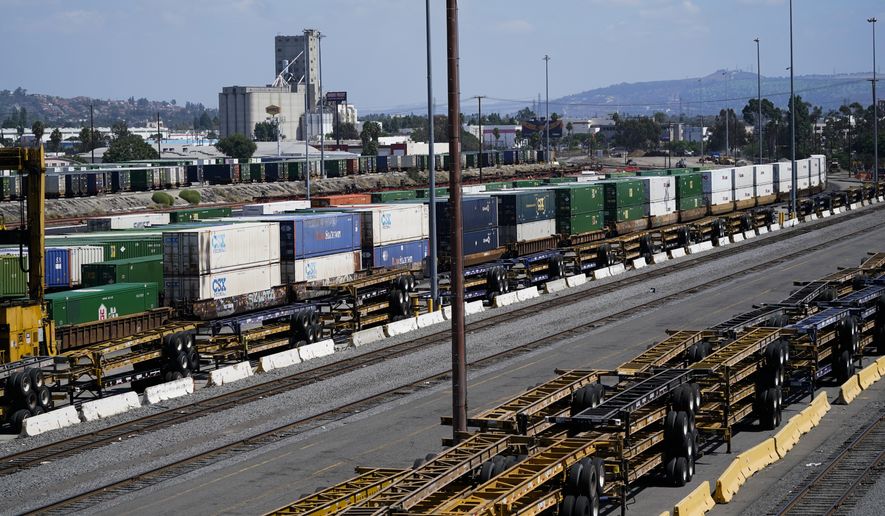Unionized freight railroad workers will receive 24% pay raises and $5,000 bonuses under an agreement reached Thursday, with the backing of President Biden, averting a strike that would have damaged an already wobbly economy.
Railroad workers also will now be able to take unpaid days off for doctor’s appointments without being penalized under railroad attendance rules, which had been a major sticking point for the workers, according to the terms of the tentative agreement.
The terms were recommended by a presidential emergency board appointed by Mr. Biden this summer. The pay raises are retroactive to July 2020, meaning the average rail worker will receive back pay of about $11,000.
The raises will be the biggest the railroad workers have received in more than four decades. The railroad industry has said that average rail worker salaries will reach $110,000 by the end of the five-year deal in 2025.
The deal includes a substantial increase to hearing aid benefits and coverage for autism without age limitations. Union members will not have any changes in copays, deductibles and out-of-pocket maximums.
The nation’s six largest railroads and representatives of 12 unions struck the deal early Thursday after more than 20 hours of negotiations at the Labor Department, ahead of a potential strike deadline that was set for 12:01 a.m. Friday.
Mr. Biden, who bills himself as labor’s biggest supporter, brought both sides to the Oval Office on Thursday morning and hailed the deal. He had called negotiators Wednesday night to urge an agreement, after making similar calls on Monday.
“This is a win for tens of thousands of rail workers, and for their dignity, and the dignity of their work,” Mr. Biden said. “It’s a recognition that during the early dark, uncertain days of the pandemic, they showed up so every American could keep going.”
All 12 unions must vote on accepting the contract.
The threat of a shutdown and more supply-chain snarls had put Mr. Biden in a delicate spot ahead of the November midterm elections. Inflation is already running at 8.3%, near a 40-year high, squeezing household budgets and eclipsing wage gains for most workers.
Labor Secretary Marty Walsh, who hosted the final talks, said he doesn’t believe the deal will add to inflationary pressures by carriers passing on higher labor costs to customers, or by other unions seeking better working conditions.
“The companies have done really well in the last couple of years,” Mr. Walsh said on Fox Business Network. “The workers have worked really hard. They have worked through a pandemic. They have kept our supply chains moving forward. And what we have to do is respect our workers, quite honestly. And I think that that’s what this contract shows. Workers are looking for a share of what profits are being made.”
U.S. Chamber of Commerce President and CEO Suzanne P. Clark called the deal “the best outcome for the American public.”
“Our nation was very close to a national rail shutdown this week, the effects of which were already beginning to be felt throughout the business community, and would have had devastating impacts to American families and our economy,” she said. “We are glad to see a rail strike averted and hope to see future negotiations finalized in a timely manner.”
The White House was careful not to criticize rail workers who wanted changes in policy on long hours, paid leave and being on-call.
“These rail workers will get better pay, improved working conditions, and peace of mind around their health care costs: all hard-earned,” Mr. Biden said. “The agreement is also a victory for railway companies who will be able to retain and recruit more workers for an industry that will continue to be part of the backbone of the American economy for decades to come.”
Mr. Biden praised Mr. Walsh for his “round-the-clock” efforts and the rail companies and unions for “negotiating in good faith.”
A stoppage on Friday would have crippled the nation’s ability to transport food, chemicals and other critical products. Many commuter trains rely on tracks owned by CSX and other big freight companies, so passengers would have been forced to find other options because of rampant cancellations.
In anticipation of a strike, Amtrak had canceled its long routes, some freight railroads had stopped taking new shipments for certain routes, and crop shipments had been scheduled to stop Thursday.
“Our rail system is integral to our supply chain, and a disruption would have had catastrophic impacts on industries, travelers and families across the country,” Mr. Walsh tweeted.
He said the tentative deal balances the needs of workers, businesses and the economy.
• Tom Howell Jr. and Joseph Clark contributed to this story, which is based in part on wire service reports.
• Dave Boyer can be reached at dboyer@washingtontimes.com.




Please read our comment policy before commenting.